What has Earth Day got to do with eating meat?
Earth Day is a world-wide movement to protect our environment. The environment is now being badly affected by global warming from greenhouse gas build-up. And livestock farming produces 20% to 50% of man-made greenhouse gases.
Livestock and Greenhouse Gas
In 2006, the UN/FAO report Livestock’s Long Shadow found that about a fifth of all human-produced greenhouse gases came from meat, dairy and egg farming. The World Bank and IFC’s report Livestock and Climate Change checked their findings in 2009. They concluded the figure was nearer to a half of all emissions.
The UN report counted the greenhouse gas from land clearing, growing animal feed, farming livestock, food processing and transporting meat and dairy products.
The World Bank report adds these missing factors:
• Animal breathing produces carbon dioxide just like humans
• Livestock breathing makes up about 14% of greenhouse gases
• A quarter of land worldwide is used for livestock grazing
• A third of farm land is used to grow food for animals
• Nearly 40% of methane gas emissions comes from farm animals
• Methane is 70 times worse than carbon dioxide in global warming impact
• 50 billion animals are raised each year rather than the first estimate of 20 billion
• Further emissions from cooking, storage, waste disposal and packaging.
Medical treatments from dietary illnesses have a high carbon cost. A diet high in animal products is related to many diseases such as heart attacks, strokes, cancer and diabetes.
Since that report, many UN agencies use the higher figure of 50%. The environmentalist Bill McKibben quotes this figure in his books and articles.
It is clear that animal farming is a very big factor in global warming.
Food’s Carbon Footprint
At least 20% of our carbon footprint comes from the food we eat every day. Every one of us can have a big impact by eating food that has a lower carbon footprint. Beef, pork, lamb and cheese have high carbon footprints. Fruit, vegetables, beans and grains have low carbon footprints.
• Eating one 8-oz steak produces as much greenhouse gas as driving 14 miles
• 70% of the clearing of the Amazon is for land to farm beef
• The world’s cows eat enough food to feed 9 billion people.
Get some tips on reducing your carbon footprint at Food’s Carbon Footprint.
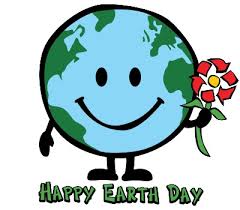 Earth Day Every Day
Earth Day Every Day
Earth Day is trying to reach one billion acts of green. Yes, your act could be to switch off the lights, take a reusable bag to the shops or walk instead of drive.
Why not make your green act an Earth Day without meat? And make it Earth Day Every Day by eating an earth-friendly diet. That means switching to a diet low in meats and high in fruit, vegetables, grains, beans, nuts and seeds.
Find out more about a healthy, earth-friendly diet at Vegetarian Nutrition.
Look at Vegetarian Recipes for some great veggie meal ideas.
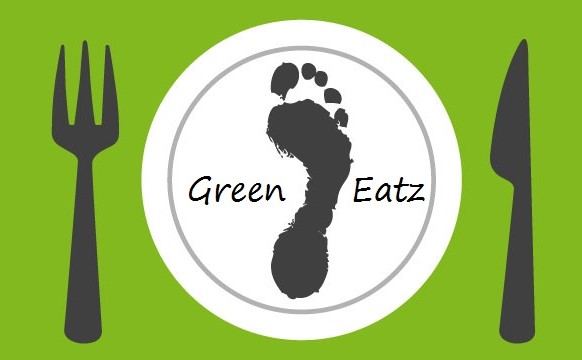
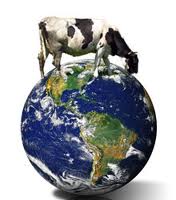
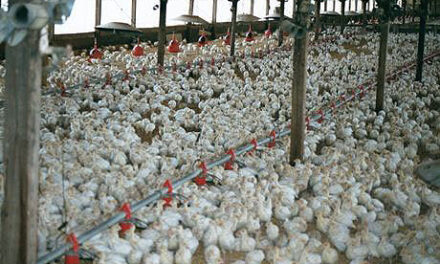
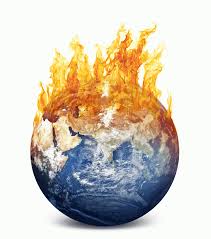
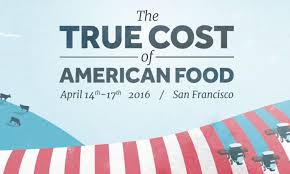
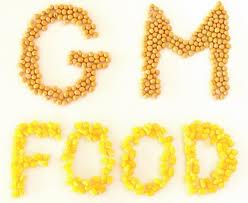

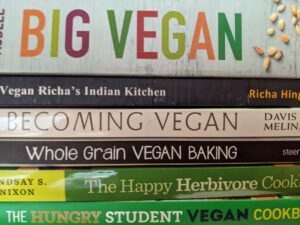
What about beer? Beer is produced with barley. With the barley you can either feed farm animals, or produce beer. Or, in that land, there could be forests.
By the way, a liter of beer, needs 4 liters of water to be produced, wine demands 4.74 liters. Hard alcohol is the greediest, guzzling 34.55 liters of water for every liter (plus barley if whiskey, or potato if vodka).
And what about the CO2 fpt of medical treatment for alcohol related issues?
So beer is terrible for the environment, when the alternative is to drink water!
Vegans drinking beer or wine shouldn’t preach about environment. Only about animal wellbeing, that’s all. Just abstemious vegan (who never takes a flight for pleasure) can talk about environmentalism.
Have a look at my blog post on Food’s Water Footprint. You’ll see that raising livestock is by far the biggest user of water – and a vegetarian or vegan has a much lower water footprint than a meat-eater. So, yes, you can be a vegan who drinks wine and beer!
I don’t think your comment makes a lot of sense. If someone is eating a diet full of animal products and creating massive amounts of greenhouse gas emissions that way, and also drinking beer and flying, then they’re creating a hell of a lot more greenhouse gas emissions in several areas of their life. Telling people it’s okay to do all the things that are destroying the planet just because a vegan might drink beer once in a while doesn’t make much sense to me. From a teetotaling non-flying vegan.
This article fails to take into account that all the land that is being used for animal agriculture is offsetting that footprint (as well as humans). Also forgets that cattle produce 3 times the protein that they consume. And also ignores the fact that 80 percent of the land in the world is actually not suited to growing fruits and vegetables. (Look at the carbon footprint of celery on a per calorie basis and it’s digusting). The carbon footprint of actual greenhouses is a lot more then animals used for food. Think about this. When was the last time a pig got in his gas car and commuted 2 hours every day going to work or driving to grocery stores.
Please read Grazed and Confused, out of Oxford and several other universities. Cows create very little food compared to the amount of water and land that they use, and create massive amounts of greenhouse gas emissions. We cannot afford animal agriculture at this stage in the game.
Regarding John Dague’s US beef herd comments. I will assume your stats are correct. The missing point is that US imports of beef have risen tremendously. So we really need to look at US beef consumption rather than US beef production. As we all know, we in the US are tremendous consumers and we import more and more each year.
A carbon tax would appropriately assign / add the cost of pollution to our various food sources (as well as e energy, transportation, etc) and motive usto make better economical and environmental decisions.
Hello,
When you say 20% of the emissions are due to the food we eat, do you mean that food production and transport in the world emits 20% global or is that 20% only related to what we eat? It makes a big difference because the food that is grown isn’t all eaten by humans: 40% is said on the web to be thrown away global, and another 20% (30% of the meat in the us) is said on the web to be used to feed pets (cats & dogs). It looks like we only eat about half of what we grow. So is if that 20% footprint is only what we eat then the production and transport footprint should be 40%. If that 20% is related to production then what we eat represents only 10% of emissions.
I’m saying that because wasting less of the food production seems to me more efficient to reduce emissions than starting to eat less of certain types of food.
Thoughts?
Sebastian
Thanks for your comment, Sebastian.
Food’s carbon footprint includes all emissions that are associated with the production of that food, including any transportation from farm to factory to shop etc. As animal agriculture produces such a massive amount of emissions compared to plant-based foods, it does certainly help to choose the most eco-friendly foods. See more at https://www.greeneatz.com/foods-carbon-footprint.html. And of course, it also has a big impact if you can reduce your food waste too – https://www.greeneatz.com/1/post/2013/01/how-to-feed-10-billion-people.html
When you look at world wide agriculture, the percentage contribution rises in comparison to the US.
https://www3.epa.gov/climatechange/ghgemissions/global.html
Also, looking forward, as developing nations become developed nations, the tendency is to consume more animal proteins so things will not get better. After all, who can blame a developing nation for emulating the developed nations.
Since it is unlikely that we will all voluntarily become vegans, choosing seafood animal proteins over other animal protein options minimizes the carbon footprint. This is from a recent talk by Dr. Steven Gaines of the UC’s Bren School of Environmental Science and Management.
https://www.cabrillomarineaquarium.org/events-news/events-details.asp?id=1372
Did you know that the majority of our CO2 emissions come from coal used to generate electricity and from petroleum fuel used for transportation? Or that in the U.S., 91.8% of greenhouse gas emissions come from sources that are not related to agriculture? Or that in the U.S., fossil fuels are responsible for 55 times the amount of CO2e produced by the U.S. beef herd. And globally, fossil fuels are responsible for 342 times the amount of CO2e produced by the U.S. beef herd. So, asking people to stop eating beef, or going meatless on Monday, is not going to be a solution for the global CO2e emissions problem.
https://www.extension.iastate.edu/agdm/articles/others/takapr08.html
If we are interested in reducing CO2 emissions, we’re going to have to reduce our electricity usage and petroleum fuel usage. This is going to be tough, because in today’s society everyone is expected to live a certain way. I don’t know of anyone who washes their clothes or dishes by hand anymore. Most people believe that it is too much work, or it takes too long. And most people don’t hang their clothes to dry on a clothes line anymore. Most Americans have homes that are cooled by an electric air conditioner, or heated by coal fired electricity, or fuel oil, or natural gas heat.
Among large nations, the U.S. is the worst offender per capita for CO2 emissions. Our government has not committed to setting a goal to reduce CO2e emissions. If we are going to reduce CO2 emissions, our government is going to have to guide the way. If automobile manufacturers were required to manufacture cars that get 100 mpg, we would all be driving a car that gets 100 mpg. If fossil fuels were taxed and renewable fuels were subsidized, we’d all be trying to find ways to use more renewable fuels. (And for the record, ethanol is not always a low CO2 fuel or a “green” alternative fuel. Ethanol may create a slight reduction in CO2 emissions versus gasoline. But, if the ethanol has been manufactured in a coal fired facility, more CO2 is produced manufacturing a gallon of ethanol than is produced from burning a gallon of gasoline.)
Here is some food for thought. In the past fifty (50) years, the U.S. beef herd has shrunk by 88%, to 29 Million today. In the same time, the U.S. population has grown by a 165% (to 317 Million), the number of registered highway vehicles in the U.S. has risen by 284% (to 245 Million), and the global population has grown by 222% (to 7.25 Billion, or 7,250 Million). At the same time that global population has been climbing, total CO2e emissions per person have been increasing as well. Atmospheric CO2 accumulations have been rising and accelerating. That does not sound sustainable to me.
If you think beef is bad for the environment, you need to realize that humans are far worse for the environment.
Hi John, Thanks for taking the time to post this comment. The figures you quote only consider the direct emissions from agriculture. Food’s carbon footprint also includes all the related emissions such as land clearing, fertilizer and pesticide production, food and livestock transportation, growing animal feedstuffs, food processing and packaging, cooking and storing food, food waste, animal manure and breath. It is generally accepted that this at least 20% of worldwide emissions but may be much more. Even the lower figure is more than all the emissions from transportation world-wide.
The US is lagging behind many other nations in its refusal to set a target for greenhouse gas reductions or provide any carbon tax mechanism. Fortunately, many of the US states and cities are leading the way in cutting emissions.
I agree that humans are very bad for the environment! That is why we all need to take personal responsibility for changing our habits to lead a greener lifestyle.
Regards Jane
“A 1% reduction in world-wide meat intake has the same benefit as a three trillion-dollar investment in solar energy.” ~ Chris Mentzel, CEO of Clean Energy
“As environmental science has advanced, it has become apparent that the human appetite for animal flesh is a driving force behind virtually every major category of environmental damage now threatening the human future: deforestation, erosion, fresh water scarcity, air and water pollution, climate change, biodiversity loss, social injustice, the destabilization of communities, and the spread of disease.” ~ Worldwatch Institute, “Is Meat Sustainable?”
“If every American skipped one meal of chicken per week and substituted vegetables and grains… the carbon dioxide savings would be the same as taking more than half a million cars off of U.S. Roads.” ~ Environmental Defense Fund
“The livestock sector emerges as one of the top contributors to the most serious environmental problems, at every scale from local to global. The findings of this report suggest that it should be a major policy focus when dealing with problems of land degradation, climate change and air pollution, water shortage and water pollution, and loss of biodiversity… The impact is so significant that it needs to be addressed with urgency.” ~ United Nation Food and Agricultural Organization’s report “Livestock’s Long Shadow”
“It’s not a requirement to eat animals, we just choose to do it, so it becomes a moral choice and one that is having a huge impact on the planet, using up resources and destroying the biosphere.” ~ James Cameron, movie director, environmentalist, new vegan
VeganVideo.Org TryVeg.Org
Hi JC Thanks for the quotes and for signing up to our mailing list. The message about meat being a big, big factor in global warming is slowly getting out there. Let’s keep spreading the word 🙂
Not to mention the fact that industrial farming practices, such as intensive meat, milk and fish production, are severely undermining our ability to treat infections with antibiotics. Medical experts are predicting an ‘apocalypse’ in terms of resistance to antibiotics within a decade.
Modern medicine is built around the use of antibiotics and without them, assuming no new technology gap plug the gap, even routine operations will be impossible or extremely risky to perform.
Governments are failing their populations by allowing the Big Meat/Dairy to continue to exploit cheap antibiotics so they can keep livestock in miserable, filthy conditions to profit from the seemingly insatiable demand for cheap meat.
If animals really are the cause of global warming then the Earth would have melted away a long time ago. The human race has consumed meat for many years yet global warming is a more recent development. Now switching to a diet higher in plant produce would undoubtedly take some methane and carbon dioxide out.
Yet these have been present from animals for centuries. The question is what has changed. The answer is, at least in part, mass production that leads to clearance of the good land which rejuvenates the atmosphere.
Thanks for the comment, Ian.
Yes, animals have always been present on our planet, but not in the vast quantities of farmed animals as today. Traditional diets are low in meat or even vegetarian but the switch to a meat-centric Westernized diet is having a huge impact on our environment. And of course, the increasing population means we need more food than ever. The report suggests that animal farming contributes about half of all greenhouse gas emissions so this is huge factor in global warming.